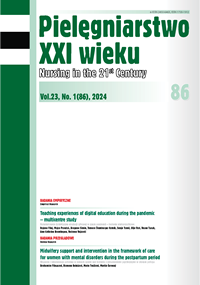Teaching experiences of digital education during the pandemic - multicentre study
DOI:
https://doi.org/10.2478/pielxxiw-2024-0012Keywords:
digital competences, education, nursing, teachersAbstract
TEACHING EXPERIENCES OF DIGITAL EDUCATION DURING THE PANDEMIC – MULTICENTRE STUDY
Aim. The COVID-19 pandemic forced many teachers to switch from traditional face-to-face teaching to the use of various digital platforms in a short period of time. The research aimed to fi nd out about teachers’ experiences of digital education at nursing faculties
in four countries (Croatia, Serbia, Slovenia, Sweden) which participated in the Erasmus+ Digital Education in Nursing project.
Material and methods. Qualitative research with semi-structured group interviews was used. A total of 28 nursing teachers participated. The interviews were transcribed verbatim and analysed inductively, using qualitative content analysis. The interviews were analysed in accordance with the study aim by searching for codes which were grouped into subcategories and then into categories based on the similarity of the content.
Results. Three important themes emerged from the analysis of the interviews: “confl icting feelings of teachers when switching to digital teaching”, “lack of digital competences”, “challenges for digital teaching in the future”.
Conclusions. Rapidly developing digital technology provides new possibilities and support for both teaching and learning. The research identifi ed the need for further development of the digital competences of teachers, who recommended that a hybrid teaching method is the best for the education of nurses, since certain skills cannot be acquired by students solely in a digital way.
References
1. Loureiro F, Sousa L, Antunes V. Use of Digital Educational Technologies among Nursing Students and Teachers: An Exploratory Study. Journal of Personalized Medicine. 2021; 11 (10): 1010. https://doi.org/10.3390/jpm11101010 .
2. Hämäläinen R, Nissinen K, Mannonen J, et al. Understanding teaching professionals’ digital competence: What do PIAAC and TALIS reveal about technology-related skills, attitudes, and knowledge? Computers in Human Behavior. 2021; 117: 106672. DOI: https://doi.org/10.1016/j.chb.2020.106672.
3. Katavić I, Milojević D, Šimunković M. Izazovi i perspektive online obrazovanja u Republici Hrvatskoj. Obrazovanje za poduzetništvo / Education for entrepreneurship. 2018; 8 (1): 95-103.
4. Kučina Softič S. Digitalne kompetencije nastavnika za primjenu e-učenja u visokom obrazovanju. Teachers’ digital competencies for e-learning in higher education. Doktorski rad/Doctoral thesis; 2020.
5. Verdnik Tajki A, Virtič T, Dinevski D. Telemedicine services in family medicine. Informatica Medica Slovenica. 2021; 26: 1-2.
6. Prosen M, Karnjuš I, Ličen S. Evaluation of E-Learning Experience among Health and Allied Health Professions Students during the COVID-19 Pandemic in Slovenia: An Instrument Development and Validation Study. International Journal of Environmental Research and Public Health. 2022; 19: 4777. DOI: https://doi. org/10.3390/ijerph19084777 .
7. Senić Ružić MM. Digitalna transformacija obrazovanja u Srbiji – pitanje digitalne pismenosti ili digitalne kompetencije; 2021.
8. The National Agency for Education; 2018.
9. Træland Meum T, Brastad Koch T, Synøve Briseid H, et al. Perceptions of digital technology in nursing education: A qualitative study. Nurse Education and Practice. 2021; 54: 103136. https://doi.org/10.1016/j.nepr.2021.103136.
10. Langegård U, Kiani K, Nielsen SJ, et al. Nursing students’ experiences of a pedagogical transition from campus learning to distance learning using digital tools. BMC Nursing. 2021; 20(23). doi: 10.1186/s12912-021-00542-1.
11. Sandelowski M. Focus on research methods: Whatever happened to qualitative description. Research in Nursing & Health. 2000; 23: 334-349. https://doi. org/10.1002/1098-240X(200008)23:4<334::AID-NUR9>3.0.CO;2-G.
12. Doody O, Slevin E, Taggart L. Focus group interview part 3: Analysis. British journal of nursing. 2013; 22 (5): 266-269. DOI: 10.12968/bjon.2013.22.5.266.
13. Krueger RA, Casey MA. Focus groups: a practical guide for applied research. Thousand Oaks, Calif.: Sage Publications; 2015.
14. Graneheim UH, Lundman B. Qualitative content analysis in nursing research: concepts, procedures and measures to achieve trustworthiness. Nurse Education Today. 2004; 24: 105-112. http://dx.doi.org/10.1016/j.nedt.2003.10.001.
15. Jowsey T, Foster G, Cooper-Ioelu P, et al. Blended learning via distance in pre¬registration nursing education: A scoping review. Nurse Education and Practice. 2020; 44: 102775. https: doi.org/10.1016/j.nepr.2020.102775.
16. Brinkley-Etzkorn KE. The Effects of Training on Instructor Beliefs about and Attitudes toward Online Teaching. American Journal of Distance Education. 2019. https://doi. org/10.1080/08923647.2020.1692553.
17. Naveed QN, Noor Qureshi MR, Tairan N, et al. Evaluating critical success factors in implementing E-learning system using multi - criteria decision-making. PLAS ONE; 2020. https://doi.org/10.1371/journal.pone.0231465.
18. Sinacori BC. How Nurse Educators Perceive the Transition from the Traditional Classroom to the Online Environment: A Qualitative Inquiry. Nursing Education Perspectives. 2020; 41(1): 16-19. doi: 10.1097/01.NEP.0000000000000490.
19. Zhao Y, Llorente AMP, Gómez MCS. Digital competence in higher education research: A systematic literature review. Computers & Education. 2021; 168: 104212. doi: 10.1016/j.compedu.2021.104212 .
20. Hampton D, Culp-Roche A, Hensley A, et al. Self-efficacy and Satisfaction with Teaching in Online Courses. Nurse Educator. 2020; 45(6): 302-306. doi: 10.1097/NNE.0000000000000805.
21. Lindfors M, Pettersson F, Olofsson AD. Conditions for professional digital competence: the teacher educators’ view. Educational Inquiry. 2021; 12(4): 390-409. https://doi.org/10.1080/20004508.2021.1890936 .
22. Tangül H, Soykan E. Comparison of Students’ and Teachers’ Opinions Toward Digital Citizenship Education. Frontiers in Psychology. 2021; 12. doi: 103389/ fpsyg.2021752059.
23. Cattaneo AAP, Antonietti C, Rause M. How digitalised are vocational teachers? Assessing digital competence in vocational education and looking at its underlying factors. Computers & Education. 2022; 176: 104358. https://doi.org/10.1016/j.compedu.2021.104358.
24. Ilomäki L, Paavola S, Lakkala M, et al. Digital competence – an emergent boundary concept for policy and educational research. Education and Information Technologies. 2016; 21(3): 655-679. https://doi.org/10.1007/s10639-014-9346-4.
Downloads
Published
Issue
Section
License
Copyright (c) 2024 Authors

This work is licensed under a Creative Commons Attribution 4.0 International License.




